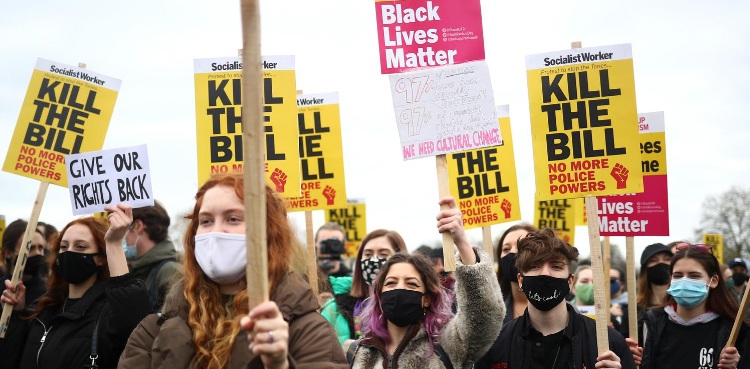KILL THE BILL! KILL THE BILL! The chant echoed through the streets of Bristol as close to 3000 people marched on 21 March to protest the new Police, Crime, Sentencing and Courts Bill 2021. This blog post aims to give you a short overview of the bill and the subsequent responses to it.

What is the bill?
The aim of the bill as described on the policy paper is for “the police to take a more proactive approach in managing highly disruptive protests causing serious disruption to the public”. The creation of this bill came out of the frustration of the police chiefs after they did not have stronger powers to control the Extinction Rebellion demonstrations in 2019.
Therefore, the bill restricts the right to protest. It will give the police the power to put conditions on protests such as being able to impose start and finish times, set noise limits and even impose these restrictions on a demonstration by just one person.
Why is it important?
Protesting is a corner stone of democracy. It is an essential tool for expressing dissent against those in power. The right to protest is enshrined in the Human Rights Act 1998. The right to protest involves the exercise of numerous fundamental human rights, however, it is a qualified right meaning it may be restricted if to do so is deemed to be in the public interest. This then begs the question; who decides what is in the public’s interest? This bill would give this authority to the police.
What happened at the protest?
The protest began at The College Green where rings of flowers were left in remembrance of Sarah Everard who was allegedly murdered by a police officer on 3 March 2020. The crowd contained people from all walks of life and with their signs in hands and chants sung loudly, the crowd started to march round Bristol city center.
The police presence at the protest was low with only a few officers dotted along the route until the march reached the outside of the police station where the police presence increased. Though most of the officers were standing watching, there was an officer recording the crowd on a camcorder. Whether intentional or not this intimidated the crowd; I observed a protestor taking my friend’s sign and standing in front of the camera to block the filming.
The majority of the protestors left early evening. However, some stayed sat outside of the police station peacefully protesting throughout the evening until police advanced onto them in full riot gear.
The Media Reporting
The media instantly demonised the crowds by siding with the police who claimed the protesters were a ‘mob of animals’, with the head of the Police federation describing the protest as ‘mindless violence’. Major newspapers reported multiple police officers suffering broken bones and even a punctured lung due to the violence. Although this was later retracted by the police as no bones were broken nor lung punctured, the first story will often receive far more coverage than the story about the retracted statement. The damage had already been done; Home Secretary Priti Patel condemned the protests as ‘thuggery and disorder’ and stated that her thoughts were ‘with those police officers injured’. In the words of George Orwell; “The people will believe what the media tells them they believe.”
It is difficult to look at the events of that evening, coupled with the inaccurate reporting which favoured the police, and not feel that it ended in favour of those supporting the bill. The violence has given ministers the fuel they need to justify the new powers for the police.
Conclusion
The reality of this bill is that it will only increase issues with protesting. If people live in fear of prosecution for organising a protest, this will mean more protests will have to be organised without a central leader. This leads to disorganised protests without central planning, inevitably leading to disorder. This means less central organisation and less police protection, putting the lives of those present at the protest and those policing the protest in even more danger, especially in COVID-times.
With the passing of this bill looking likely, what is to become of protesting in England and Wales?
By Kitty Robertson for Studenteer
© All Rights Reserved, Studenteer 2021

